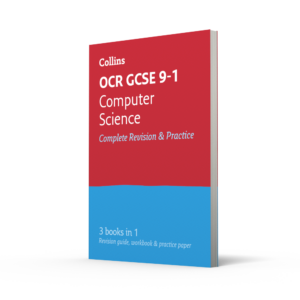
One thing you can say about Computer Science as a teaching subject is that it certainly isn’t static! The nature of computing, new technology, processing speeds and programming language developments means that to stay relevant the courses that support it need to be ‘patched’ on a regular basis. I’ve been lucky enough to update my original OCR J276 Complete Revision & Practice guide to meet the new J277 specification and I’ve enjoyed the challenge of researching recent developments and looking for those real-life examples that will grab the attention of the student when studying it.
Having taught ICT and Computer Science for many years, my biggest piece of advice to any teacher is to think about adding context to your lessons as often as possible and ensuring your lessons are as up-to date as possible. When tackling new learning, a new topic outside of your students’ experience can sometimes be dismissed by them as simply just another explanation to be memorised for the exams. Students will take hold of new learning better if they can link it to their own life in some way, however small, and associate memories to it. This is where context is so important, and Computer Science is lucky in that there are so many examples in a modern young person’s life that directly link to the new OCR J277 curriculum.
I’d like to outline just a couple of examples of where I have focussed on context, both in lessons and in the new Collins OCR GCSE 9-1 Computer Science Complete Revision & Practice book:
- Hacking and security issues: There are so many real-world examples to focus on in this topic, from individuals being scammed to virus attacks on international power installations. Choose a selection of reputable news organisations and search their archives for recent examples to discuss with students.
- Algorithms: Suggestions for songs, movies, TV shows, potential friends and even exam grades are now largely controlled by computer scientists. An analysis of the information we willingly, and unwillingly, provide to government, social networks and entertainment platforms has so much potential for classroom discussion.
- What does business do? From data protection to health and safety, large organisations will put together their own training material and often post it online. Look at and discuss these examples of how cybersecurity protocols are implemented the real world, from promotional IBM videos exploring hacking scenarios to how the Metropolitan Police service advise the public against cybercrime.
- Training providers: With Computer Science being a relatively new course, there are dozens of programming courses aimed at adults around the world wanting to re-skill or improve existing skills in anything from Python to C++. Many of these courses are free, with supporting smartphone apps and quizzes.
There has never been a better time for promoting Computer Science courses – and taking the time to see how the subject plays a part in almost every aspect of our lives will grab the attention of potential GCSE and A-Level students.

Paul Clowrey is a freelance educational author and designer. He has over 15 years of teaching experience in ICT, computer science and developing eLearning as a teacher, head of department and in school leadership roles. Paul is also the author of the Collins OCR GCSE 9-1 Computer Science Complete Revision & Practice and Workbook, now updated to the newest J277 specification.



